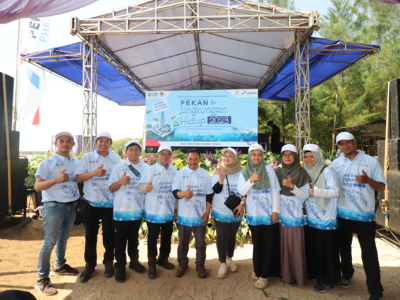Prof Hefni Effendi Collaborates with PHE ONWJ and DLH West Java Province Celebrates World Environment Day

Every June 5, people who care about the environment around the world celebrate Environment Day by holding various events. The celebration is dedicated to preserving environmental functions and services.
This year the United Nations Environment Program (UNEP) carries the theme ‘Beat Plastic Pollution’ in celebration of Environment Day. Every year the theme is determined based on hot issues and trends at the time. Of course every country will celebrate Environment Day according to their respective priorities, referring to the theme that has been proclaimed globally.
“Plastic is one of the synthetic materials used everywhere today. When we are in remote areas, both in terrestrial ecosystems and marine ecosystems, we cannot escape encounters with plastic waste. This plastic problem does not only occur spatially (space), but also in a different temporal (time) way. So anywhere and anytime, we will find plastic as a pile of garbage,” said Prof Hefni Effendi, Professor of IPB University.
As part of a global community that cares about environmental sustainability and the sustainability of natural resources, Indonesia also celebrates Environment Day which is centered at the location of the National Capital City (IKN) of the Archipelago which is held offline and online. Likewise, in almost all provinces of Indonesia, celebrations were held simultaneously.
For West Java Province, the celebration of Environment Day is centered at the Learning Restoration Center, Pasir Putih Mangrove Ecotourism, Sukajaya Village, Cilamaya Kulon District, Karawang Regency in mid-June.
This location was chosen because mangrove rehabilitation activities in this place were considered to show significant positive results. On the other hand, this location is used as a beach resort which is quite popular with visitors.
The rehabilitation and maintenance of mangroves here is a long-term collaboration between PT Pertamina Hulu Energi Offshore North West Java (PHE ONWJ) and surrounding community groups, under the supervision of the Karawang Regency Environmental Service (DLH), West Java Province DLH, Maritime Affairs and Fisheries. (DKP) Karawang Regency and DKP West Java Province.
The celebration of Environment Day in Karawang was initiated by PHE ONWJ in collaboration with DLH West Java Province and other government agencies. In its implementation it also involved a research team from the Center for Environmental Science (PPLH) IPB University.
Prof Hefni Effendi as the head of the IPB University team for this Environment Day celebration revealed that the collaboration between PPLH IPB University and PHE ONWJ had been established for a long time. This synergy covers various matters related to environmental management on the north coast of West Java around the location where PHE ONWJ carries out offshore oil and gas exploration and exploitation operations.
“Complete the mangrove planting which has been carried out at this location previously by PHE ONWJ, when the event took place symbolically also planted 1,000 mangroves and various types of associated mangrove plants in order to enrich the number of species and the number of individual plants,” said Prof Hefni.
He hopes, “With the effort to add species, it is hoped that there will also be an increase in the diversity index of flora and fauna in this location.” The action also involved elementary school children (SD) and the community around the location to jointly carry out a beach clean-up by collecting organic and inorganic waste.
Prof Hefni also stated that environmental rehabilitation efforts should be bottom-up based. The aspiration to protect the environment and rehabilitate the environment should arise from the people who live around the degraded land.
“When these aspirations arise from the community, a desire (passion) will also arise to take action independently and take care of them. The sense of ownership will also be maintained,” said the Head of the Department of Aquatic Resources Management (MSP), Faculty of Fisheries and Marine Sciences (FPIK) IPB University.
Furthermore, he continued, it is this action based on independence that should be supported by corporations and supervised by the government in its implementation. Academics entered into this collaboration through technical assistance starting from planning, operating and monitoring the rehabilitation process.
“When the basic pillars of stakeholders involved in the rehabilitation and maintenance of mangroves play their respective roles well, then undoubtedly efforts to rehabilitate mangroves that have been degraded by natural or anthropogenic effects will produce sweet success,” said Prof. Hefni. (HEF/Rz) (IAAS/YMK)



